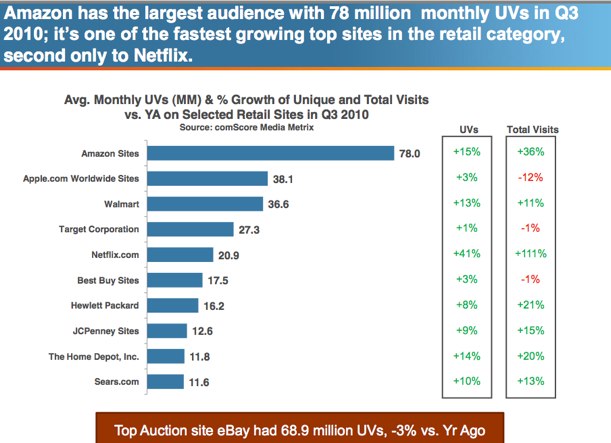 Yesterday brought the news that eBay acquired in-store product inventory search startup Milo for $75 million. eBay said that it plans to integrate Milo into both its online marketplace and its mobile applications, including barcode scanning app RedLaser. But tucked away in the press release eBay issued about the acquisition were a few surprising stats about the number of product searches eBay and its competitors are handling.
Yesterday brought the news that eBay acquired in-store product inventory search startup Milo for $75 million. eBay said that it plans to integrate Milo into both its online marketplace and its mobile applications, including barcode scanning app RedLaser. But tucked away in the press release eBay issued about the acquisition were a few surprising stats about the number of product searches eBay and its competitors are handling.
According to comScore, eBay handled more than 2 billion U.S. product searches in the third quarter. For the same time period, Amazon saw 847 million searches, while Google handled only 226 million product searches.
Really? The data seems a bit surprising considering Amazon’s dominance in the e-commerce market. In fact, comScore reported in its 2010 Q3 State of the U.S. Online Retail Economy report, that Amazon had the largest audience in the quarter, averaging 78 million monthly unique visits, surpassing Apple, Walmart and Target. eBay, which comScore said was the top auction site for the quarter, had 68.9 million unique monthly visits, which was down 3 percent from last year. But apparently, there is a lot more product searching going on there than on Amazon.
Google’s low product searches are less surprising considering that its product search isn’t nearly as expansive as Amazon’s. And Google doesn’t actually sell products. That being said, Google just launched major improvements to its product search (including more local inventory listings), which should help draw more traffic and searches.
For eBay, the wealth of data from product searches is certainly something that could be mined and used for recommendations, and other products.
We asked Google for comment on eBay’s stats, and received this response:
“We typically don’t share performance metrics for individual search properties.”
We’ve also contacted Amazon for comment, we’ll update when we hear back (though the company has notoriously had an aversion to providing specific numbers (i.e. Kindle sales).

